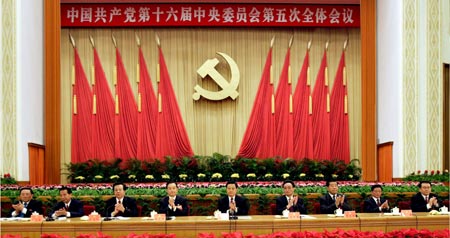The CPC was founded on July 1, 1921. It is the ruling party in China, representing the interests of the entire Chinese nation and serving as the core leading China's socialist modernization drive. By the end of 2005, the CPC had 70.8 million members. Its grassroots organizations numbered 3.52 million, including 170,000 committees, 210,000 organization departments and 3.14 million subcommittees.
After the founding of the People's Republic of China in 1949, the CPC led the Chinese people of all ethnic groups to overcome various difficulties, transforming China from a poor and backward semi-colonial and semi-feudal country into a socialist state with initial prosperity.
The CPC mainly exercises ideological and political leadership. It derives its ideas and policies from the people's concentrated will and then transforms them into state laws and decisions that are adopted by the NPC. But the CPC does not take the place of the government in the state leadership system. It conducts activities within the framework of the Constitution and laws, which it has no right to transcend. All CPC members, like other citizens in the country, are equal before the law.
In 2006, a total of 97,260 CPC members received disciplinary sanctions, accounting for 0.14 percent of the total membership. Of them, those who were punished for endangering public order, dereliction of duty, corruption and violations of financial disciplines totaled 78,980. In addition, 3,530 people suspected of committing crimes, including seven provincial- and ministerial-level officials, were handed over to prosecutors, making up 3.6 percent of total punished members. Compared with the previous year, the number of major crime-prone cases investigated by CPC commissions for discipline inspection and supervisory departments of the government at various levels declined 10.9 percent.
Renmin Ribao (People's Daily) is the organ of the CPC Central Committee, and Qiushi (Seeking Truth) is its theoretical publication
CPC Central Leadership
The current CPC Central Committee was created in the 16th CPC National Congress held in November 2002, composed of 198 members and 158 alternate members.
Hu Jintao is incumbent general secretary of the CPC Central Committee.
 |
Standing Committee members of the Political Bureau of the Central Committee of the Communist Party of China (left to right): Luo Gan, Wu Guanzheng, Zeng Qinghong, Wen Jiabao, Hu Jintao, Wu Bangguo, Jia Qinglin, Huang Ju (dead), Li Changchun.
Political Bureau of the CPC Central Committee
Standing Committee Members: Hu Jintao, Wu Bangguo, Wen Jiabao, Jia Qinglin, Zeng Qinghong, Huang Ju, Wu Guanzheng, Li Changchun and Luo Gan
Members (listed in the order of number of strokes in their surnames): Wang Lequan, Wang Zhaoguo, Hui Liangyu (Hui), Liu Qi, Liu Yunshan, Li Changchun, Wu Yi (female), Wu Bangguo, Wu Guanzheng, Zhang Lichang, Zhang Dejiang, Luo Gan, Zhou Yongkang, Hu Jintao, Yu Zhengsheng, He Guoqiang, Jia Qinglin, Guo Boxiong, Huang Ju, Cao Gangchuan, Zeng Qinghong, Zeng Peiyan and Wen Jiabao
Alternate Member: Wang Gang
Secretariat of the CPC Central Committee
Members: Zeng Qinghong, Liu Yunshan, Zhou Yongkang, He Guoqiang, Wang Gang, Xu Caihou and He Yong
Central Military Commission
Chairman: Hu Jintao
Vice Chairmen: Guo Boxiong, Cao Gangchuan and Xu Caihou
Members: Liang Guanglie, Li Jinai, Liao Xilong, Chen Bingde, Qiao Qingchen, Zhang Dingfa (dead) and Jing Zhiyuan
Central Commission for Discipline Inspection
Secretary: Wu Guanzheng
Deputy Secretaries: He Yong, Xia Zanzhong, Li Zhilun, Zhang Shutian, Liu Xirong, Zhang Huixin, Liu Fengyan, Ma Wen (female) and Gan Yisheng
Leaders of Organs Directly Under the CPC Central Committee
Director of the Organization Department: He Guoqiang (concurrently)
Director of the Publicity Department: Liu Yunshan (concurrently)
Director of the United Front Work Department: Liu Yandong (female, concurrently)
Director of the International Department: Wang Jiarui
Director of the General Office: Wang Gang (concurrently)
President of the Central Party School: Zeng Qinghong (concurrently)
Publisher of Renmin Ribao (People's Daily): Wang Chen
Publisher of Qiushi (Seeking Truth): Wu Hengquan
Director of the Party History Research Center: Li Jingtian
Director of the Party Literature Research Center: Teng Wensheng
Director of the Compilation and Translation Bureau: Wei Jianhua
Secretary of the State Organs Work Committee: Hua Jianmin (concurrently)
Secretary of the Work Committee for Organs Directly Under the CPC Central Committee: Wang Gang (concurrently)
Director of the Committee for Political and Legislative Affairs: Luo Gan (concurrently)
Director of the Committee for Comprehensive Management of Public Security: Luo Gan (concurrently)
Director of the Policy Research Office: Wang Huning
Director of the Taiwan Work Office (Taiwan Affairs Office of the State Council): Chen Yunlin
Director of the International Communication Office (Information Office of the State Council): Cai Wu
Director of the Foreign Affairs Office: Dai Bingguo
Director of the Office of the Committee of Secretes (National Administration for the Protection of State Secrets): Xia Yong
Director of the Bureau of Security: You Xigui
Director of the Archives Bureau (State Archives Administration): Yang Dongquan
Source: www.xinhuanet.com, as of March 10, 2007
The Sixth Plenum of the 16th CPC Central Committee
The Sixth Plenary Session of the 16th CPC Central Committee was held in Beijing on October 8-11, 2006, with the presence of 191 members and 150 alternate members of the committee. The meeting listened to and deliberated a work report delivered by General Secretary Hu Jintao of the CPC Central Committee. It also deliberated and approved the Decision on Major Issues Concerning the Building of a Socialist Harmonious Society, putting forth detailed measures for this purpose in the next following years.







